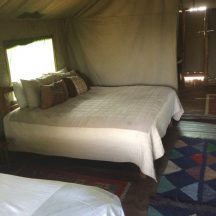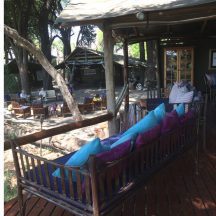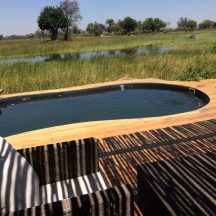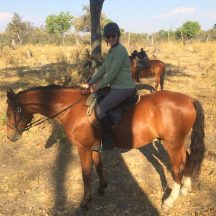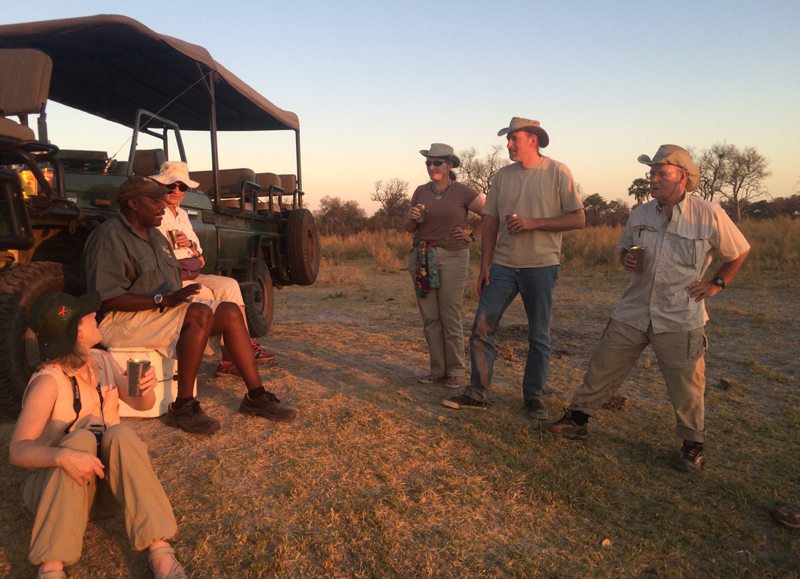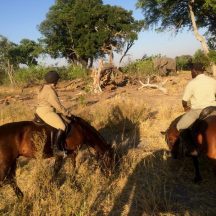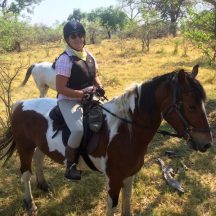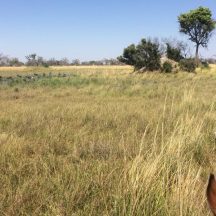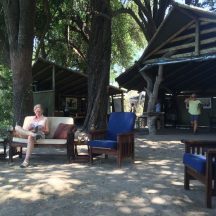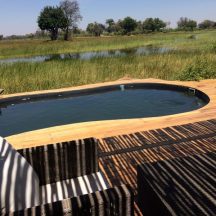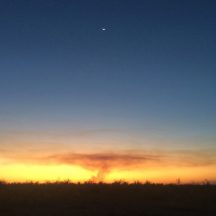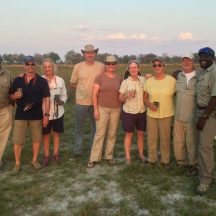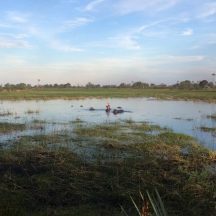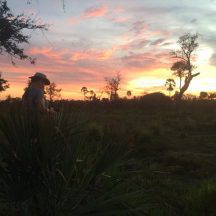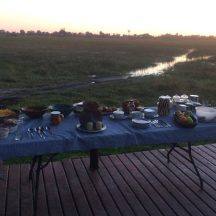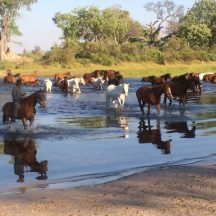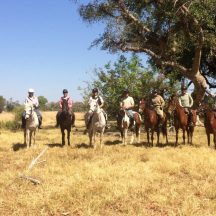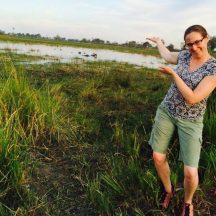Flying in on a helicopter it’s easy to see where the Okavango Delta begins, a startling oasis of green surrounded by stark desert. As we entered the delta from Maun, the pilot pointed out the “buffalo fence” designed to keep livestock and wildlife separated, but noted how elephants cannot be counted upon to respect the boundary.
Botswana boasts the most concentrated population of elephant anywhere in the world, and they were nearly ever-present during the safari, starting with the glimpse of them from above.
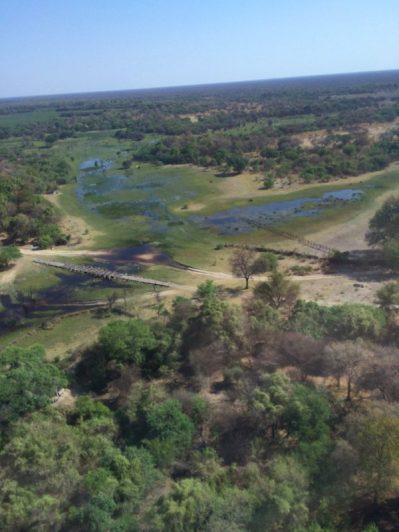
Entering the delta by helicopter
Landing at Kujwana camp, we were greeted by the camp staff who would provide consistent hospitality throughout our 10 nights (upon leaving at the end of our stay we joked how it seemed so strange to no longer be offered drink and food during all our waking hours!). Kujwana is the permanent base camp from which the Okavango Safari operates, with facilities for horses, guests and staff year round. On the edge of a river, it affords lovely views over the plains that become flooded during the water’s high season in the summer months. The camp is incredibly comfortable, with lounging spaces and a pool, a dinner and bar tent, and spacious personal tents with en suite bathrooms The camp also offers a charging station and some wifi access; affording every comfort of home and then some! We were often visited by a young bull elephant who seemed quite interested in the camp scene, and vervet monkeys who dashed about and chattered from the trees and dining tent roof. Each morning we’d be awoken at 5am with a tray of tea and coffee brought to our tents, then we watched the sun rise over the delta while eating breakfast together, so we could next mount up early enough to beat the October heat.
- My lovely tent
- View of camp
- The pool
- Mabowe, my favorite Botswana Warmblood
The horses have wonderful lives in the delta, grazing in the rich green grass and being carefully protected from predators. Many are home bred, most descending from an Saddlebred stallion who, although now retired, is still the herd leader. These “Botswana Warmbloods” are beautiful, with great size and temperaments.
The outfitter also uses Thoroughbreds, Arabians, Friesian crosses, Clydesdale crosses and local African breeds. The tack is of wonderful quality, and never have I been so comfortable riding, as I was fully pampered with a seat saver and well-fitted equipment. Morning rides followed the trails of buffalo, giraffe, and of course, elephant, and although we were there when the delta was at its lowest point, we still crossed wet areas which are home to lechwe and reedbuck antelope. I know I was not the only member of our group to be giddy with childlike joy when we took these crossings at a canter, getting a cooling splash as our horses moved like they were flying.
We’d have some breaks from riding, to both walk and for some refreshment, before returning home to camp for lunch. The food was excellent and would be followed by a long siesta of napping or relaxing in the pool. We’d be fed yet again for tea at 4pm before going out for an evening game drive with sundowners before our evening candlelit dinner and well-earned rest.
I had some of the most exciting moments by horseback of my life riding in the delta – elephants shaking their heads and flapping their ears at us, considering a mock charge, or even more terrifying to our horses, ground birds startling up from beneath their hooves. One morning in the path ahead I saw a feline character: “A leopard!” our guide, Rodgers, told us, and we trotted behind him as he went to get a better look. He saw that there were two, and they went off into the tall grass to our left. Knowing that a leopard is not likely to be aggressive toward a horse in the way that a lion would be, Rodgers ventured into the grass to try to flush one out and away from us so that we could get a better look.
Video from Sascha Abramson’s GoPro
We waited tensely, with reins shortened, eager to see what Rodgers would find. While he had been focusing on the leopard he had seen crest the small hill, he hadn’t realized the second was right beside his horse, laying low until he ventured right near it. Out it sprang from the tall grass, with a deep and rumbling roar as it burst towards and quickly by us. The horses had scattered, but upon hearing Rodgers telling us to look quickly, I turned in time to see the elusive form streak past. The whole group burst into adrenaline fueled laughter as Rodgers began recounting the event, telling the story that would be relived often during the rest of the trip.
Another morning we had just dismounted to walk the horses to rest them a bit when Rodgers spotted a wild dog up ahead. He excitedly bade us to all mount up again and off we went on the trail – they are infamously hard to find and seeing this group on the hunt was an exciting spot. We followed them for as long as we could, getting a good glimpse of several in an open meadow before they disappeared in the search of their own quarry. On an afternoon ride we encountered a huge herd of about 300 Cape Buffalo. They’re intimidating creatures, as they trot inquisitively toward items of interest with their huge horns hanging. We stood and observed each other for a few wonderful long moments before the herd took off, and we cantered along beside them.
We spent a long morning game drive on a futile quest to find the few rhinoceros known to be in the area. We couldn’t find anything more than their tracks until the next day on horseback when we stumbled across a mother with her calf. Off Rodgers went again, on a merry chase trotting and cantering to get a glimpse of the great ungulates.
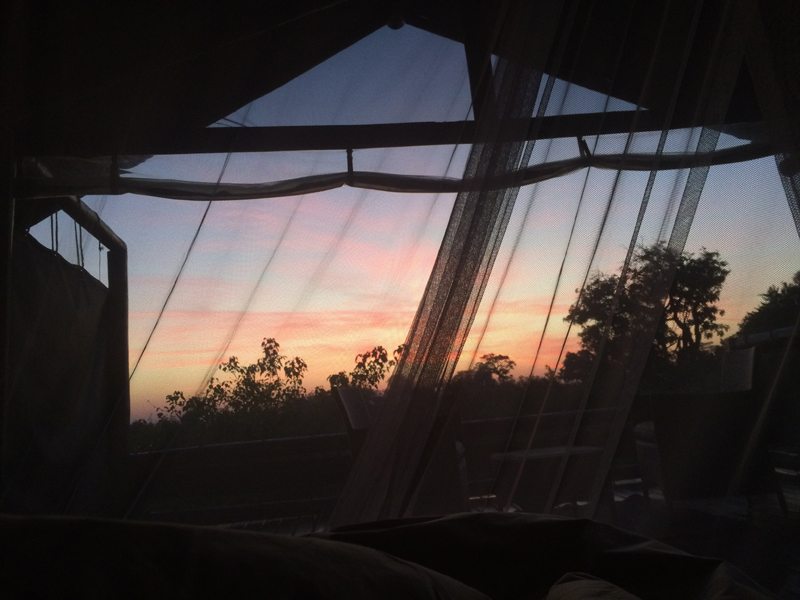
For three nights our home was at Mokolwane Camp, a full day’s ride away, which allowed us to have a wonderful picnic lunch on the trail complete with swimming in the river on the way to and from. Mokolwane is a type of palm tree common in the area, of which you can have wonderful views from the amazing tree house tents. These tents are on platforms 10 feet of the ground, the front wall totally open to the sounds and views of the spectacular country. I watched an elephant browse right below me, and baboons calling and traveling only a few feet away. The sounds of nature were amazing here, and it was unbelievably beautiful to wake up to the sunrise seemingly right there in the tent with you.
So many aspects of this trip were so special and entirely unique: access by helicopter to see spectacular bird and wildlife, guides who were so knowledgeable about the area, the game drives that allowed us to get great views of animals like lion, and the island like location of the camps that meant we crossed by mokoro (canoe), boat or horse, adding additional fun to the exotic experience. The camps were so fabulous that I didn’t want to leave, and the opportunities for excitement and relaxation both made this an African adventure to always treasure.
- Watching the elephant
- Another wonderful horse and rider
- Marabou Storks
- Back at camp after a ride
- The relaxing pool at Kujwana Camp
- Botswana Sunset
- The sundowner group
- Hippo pool
- Another beautiful sunset
- Breakfast at Mok Camp
- The horse herd being brought to pasture
- Our group on our final ride


